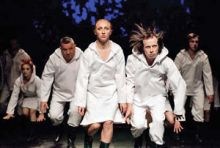The concept of the well-known East-European forum, which has been held in Poland for the 17th time, is remarkable for interest the organizers of the festival take in the theater of the neighboring countries (above all, Russia, Ukraine, and Belarus). The main program includes several Russian plays, which show the trends of contemporary theater. So, Moscow’s Teatr.doc presented a documentary drama Two in Your House about the Belarusian writer and oppositionist Uladzimir Niaklajeu. “Teatr post,” made up by the young Saint-Petersburg team of the graduates of Lev Dodin’s class showed two productions based on the plays by the trendy contemporary Belarusian author Pavel Pryazhko, in which they applied the popular theory of an alternative development of the contemporary art, as a post-dramatic performative theater.
Incidentally, it was owing to the program of Theater Confrontations that Ukrainian audience knows some of the Polish plays of this forum, too. For example, the festival held the premiere of the TV version of the much-talked-of production Karamazov Brothers by Provisorium Theater, which has been shown in Ukraine two years ago. The Kyiv audience has also seen the music opus by Marta Gornicka The Chorus of Women, which has reached Lublin only now. However, the play that sparked the most controversy was Pawel Passini’s Turandot based on Giacomo Puccini’s eponymous play.
Currently, to mark Passini’s 10th anniversary of creative activity the Confrontations’ program “Lublin Showcase” (a “fair” of the best local productions of the recent time) presented a number of his works, both music and theater productions. It also launched the modern production NetTheater inspired by Tadeusz Kantor’s works and cabbalistic texts under the title of Puppet. The Book of Splendor, whose sensational premiere took place in Edinburg in summer. Of all Passini’s plays Petit Pets Petty Secrets seemed to be one of the most interesting. Above all, the performance is attractive in terms of visual perception, thanks to the strange costumes of animals and pieces of fabric, hung over the stage: they could be either clouds, or crowns of trees, but in both cases – the screens on which the video was projected all the time. The performance, which is complicated both in music and technical arrangement, shows the youngest generation totally immersed in computer technologies. Parents who will bring their children to this production will be able to discover similar features in the inhabitants of the forest, and if they put some effort, they will read a political leitmotif there.
Incidentally, the Modjeska Theatre from the town of Legnica, Poland, turned out to be socially oriented. Whereas in one of the presented productions (The Orchestra) the action unfolds around the tragedy on a local mine, the other one, III Furies, scatters in a harsh, punk style several myths from the Polish history at a time, specifically such painful wounds as the Holocaust of Jews and the activity of Armia Krajowa.
Daisuke Yoshimoto’s show performed in an amazingly precise and filigree manner (presented within the framework of the MAAT program) turned out to be an indisputable leader of the festival – a quiet, concentrated, almost meditative dance about the opposition of man and time.
On October 26 Kyivites had an opportunity to see at the Kurbas Center one of the most contradictory plays of the forum Aporia’43/Decalogue: Local World War (a joint work of the Lublin InVitro Pre-Premiere Stage and Arabesky Theatre, Kharkiv). The part “Decalogue: Local World War” was staged by director Svitlana Oleshko, and “Aporia’43,” by director Lukasz Witt-Michalowski. Apart from the same topic, both parts involved a common team, including the actors, set design, and composers. The Ukrainian-Polish conflict in the backdrop of the World War II turned out to be a very painful and complicated topic even today. Are we able to talk about it? Yes, we are, even without a shade of conflict. Do we need it now? Beyond doubt. It is time for us to learn to listen to each other.







